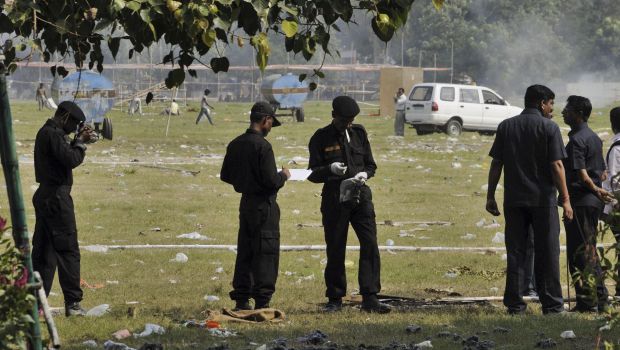
Indian National Security Guard soldiers collect evidence from the site of a blast in a central park in Bihar’s state capital of Patna, India, on Monday, October 28, 2013. (AP Photo/Aftab Alam Siddiqui)
While Modi was not in the immediate vicinity of any of the blasts in the state of Bihar on Sunday, they were a reminder of India’s bloody political history, which includes the assassination of former prime minister Rajiv Gandhi at an election rally in 1991.
The Hindu nationalist Modi is seen as a target of Islamist militants who hold him responsible for riots in 2002, during his first term as chief minister of Gujarat state, in which at least 1,000 people, most of them Muslims, were killed.
Modi denies any role in the 2002 riots or bias against India’s minority Muslims. He used the rally on Sunday to call for unity between all poor people.
His Bharatiya Janata Party (BJP) criticized the Bihar government for not securing the ground where tens of thousands of supporters gathered, and demanded that authorities overseeing preparations for a general election next year do more to stop attacks.
“The kind of explosion that took place yesterday at Narendra Modi’s rally reveals a devilish conspiracy mentality,” BJP vice president Mukhtar Abbas Naqvi said after meeting the top electoral agency.
“It is important for the election commission to prevent such incidents,” he said.
Another party leader, Subramanian Swamy, said he wrote to the prime minister demanding candidates such as Modi be given secret service-style security, currently reserved for serving and former prime ministers and close relatives.
At least six crude bombs exploded near the rally ground in Bihar’s capital, Patna, after an initial blast at its railway station. Police recovered four unexploded devices inside the ground, none close to the stage where Modi spoke.
Television images showed flames shooting several metres into the air when one of the devices exploded. Despite the bloodshed, Modi spoke for about an hour after rally organizers decided cancelling the event would risk triggering a stampede.
“Four unexploded bombs were recovered from Gandhi Maidan. All the bombs were planted in the peripheral areas,” said Sushil M Khopde, inspector general of police in Patna, referring to the rally site.
Link to militant group?
Modi’s likely main challenger in the next election, Rahul Gandhi, the son of Rajiv Gandhi, said last week that he too was worried about assassination. Rahul’s grandmother, Prime Minister Indira Gandhi, was assassinated in 1984.
Police said they had arrested a suspect after the first explosion at Patna railway station and said he had given details of the operation. They said they found a piece of paper on him listing seven other suspects.
Police also said they had found a suspicious substance at the suspect’s residence and were testing to see if it was an explosive. They also found a pressure cooker and wires. Pressure cookers can be packed with explosives to make bombs.
A senior police officer in Patna told Reuters they were investigating the possibility that a home-grown Islamist militant group, the Indian Mujahadeen, was behind the attack, but the suspect has not admitted any connection to the group.
India holds the Indian Mujhadeen responsible for the deaths of hundreds of people in numerous attacks over the last eight years. The organisation, which has links to Pakistan-based militants, often uses multiple small bombs in attacks.
An official at the National Intelligence Agency, India’s top counter-terrorism body, said an analysis of the devices from Sunday’s attack showed they were similar to bombs used in July at the Bodh Gaya Buddhist pilgrimage site.
Both attacks used ammonium nitrate and similar timers and circuitry, said the official who declined to be identified.
There was no sign of unrest on Monday by Modi’s supporters in his home state of Gujarat, where he has served three terms as chief minister and has overseen rapid economic growth since the 2002 riots.
